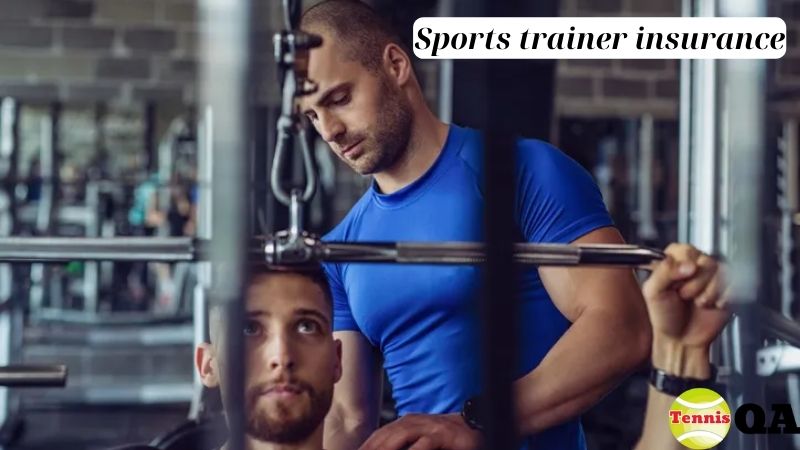In the dynamic world of sports training, where athletes push their limits and strive for excellence, the role of sports trainers is paramount. These professionals play a crucial role in guiding athletes, honing their skills, and ensuring peak performance. However, along with the rewards of their profession come inherent risks and liabilities.
From training sessions to events and competitions, sports trainers face various challenges that can result in unforeseen accidents or incidents. This is where Sports Trainer Insurance steps in, providing essential coverage to protect against potential liabilities and risks. In this comprehensive guide, tennisqa.com delve into the world of sports trainer insurance, exploring the types of coverage available, their importance, and factors to consider when choosing insurance.
Understanding the Role of Sports Trainer

Before delving into insurance specifics, it’s crucial to understand the role of sports trainers and the responsibilities they undertake. Sports trainers are highly skilled professionals who work closely with athletes to enhance their performance, prevent injuries, and facilitate recovery. They design training programs, provide guidance on proper techniques, and oversee athletes’ physical conditioning. However, amidst the rigors of training and competition, sports trainers face potential risks and liabilities that necessitate adequate insurance coverage.
Types of Insurance Coverage for Sports Trainers
Sports trainers require various types of insurance coverage to safeguard against potential risks and liabilities. These include:
1. General Liability Insurance General liability insurance is essential for sports trainers as it provides coverage for bodily injury, property damage, and legal defense costs arising from accidents or incidents that occur during training sessions or events. This type of insurance protects sports trainers from third-party claims and lawsuits, providing financial security and peace of mind.
2. Professional Liability Insurance Professional liability insurance, also known as errors and omissions insurance, is crucial for sports trainers as it protects against claims of negligence, errors, or omissions in their professional services. This coverage is essential in cases where athletes suffer injuries or harm due to alleged mistakes or oversights during training sessions or competitions.
3. Workers’ Compensation Insurance Sports trainers who employ staff or assistants must also have workers’ compensation insurance. This coverage provides benefits to employees who suffer work-related injuries or illnesses, including medical expenses, lost wages, and disability benefits. Workers’ compensation insurance is mandatory in most states and helps ensure that employees are adequately protected in the event of on-the-job injuries.

4. Accident Medical Insurance Accident medical insurance provides coverage for athletes’ medical expenses resulting from injuries sustained during training sessions or competitions. This type of insurance helps cover the costs of emergency medical treatment, hospitalization, surgery, and rehabilitation, ensuring that athletes receive the care they need without financial burden.
Importance of Sports Trainer Insurance
General liability insurance is a cornerstone of sports trainer insurance, providing essential coverage for bodily injury, property damage, and legal defense costs. In the fast-paced world of sports training, accidents and injuries can occur unexpectedly, exposing sports trainers to potential liabilities and lawsuits. General liability insurance protects sports trainers from financial losses arising from such incidents, allowing them to focus on their work without worrying about legal or financial repercussions.
Professional Liability Insurance for Sports Trainers
Professional liability insurance is equally important for sports trainers as it protects against claims of negligence, errors, or omissions in their professional services. In the highly competitive and demanding field of sports training, athletes rely on their trainers to provide expert guidance and support. However, mistakes or oversights can occur, leading to injuries or harm to athletes. Professional liability insurance provides coverage for legal defense costs and damages in such situations, ensuring that sports trainers are adequately protected against potential lawsuits and claims.
Workers’ Compensation Insurance

Workers’ compensation insurance is essential for sports trainers who employ staff or assistants. This coverage provides benefits to employees who suffer work-related injuries or illnesses, including medical expenses, lost wages, and disability benefits. In the physically demanding and high-risk environment of sports training, injuries can occur to both athletes and staff. Workers’ compensation insurance ensures that employees receive the care and support they need in the event of on-the-job injuries, while also protecting sports trainers from potential legal liabilities.
Accident Medical Insurance
Accident medical insurance provides coverage for athletes’ medical expenses resulting from injuries sustained during training sessions or competitions. This type of insurance helps cover the costs of emergency medical treatment, hospitalization, surgery, and rehabilitation, ensuring that athletes receive the necessary care without financial burden. In the fast-paced and physically demanding world of sports, injuries are a common occurrence. Accident medical insurance provides athletes with peace of mind knowing that they will receive the care they need without worrying about the cost.
Factors to Consider When Choosing Insurance
When selecting insurance coverage, sports trainers must consider several factors to ensure they have adequate protection against potential risks and liabilities. These factors include coverage limits, deductibles, premiums, exclusions, and the reputation of the insurance provider. Sports trainers should carefully review their insurance policies, seek guidance from insurance professionals, and assess their specific needs and risks to choose the most appropriate coverage for their situation.
Conclusion
In conclusion, sports trainer insurance is essential for protecting against the risks and liabilities inherent in the profession. From general liability insurance to professional liability insurance, workers’ compensation insurance, and accident medical insurance, sports trainers require comprehensive coverage to safeguard themselves, their staff, and their athletes. By understanding the types of insurance available, their importance, and the factors to consider when choosing coverage, sports trainers can ensure they have adequate protection to focus on what they do best – training athletes and helping them achieve their goals.

